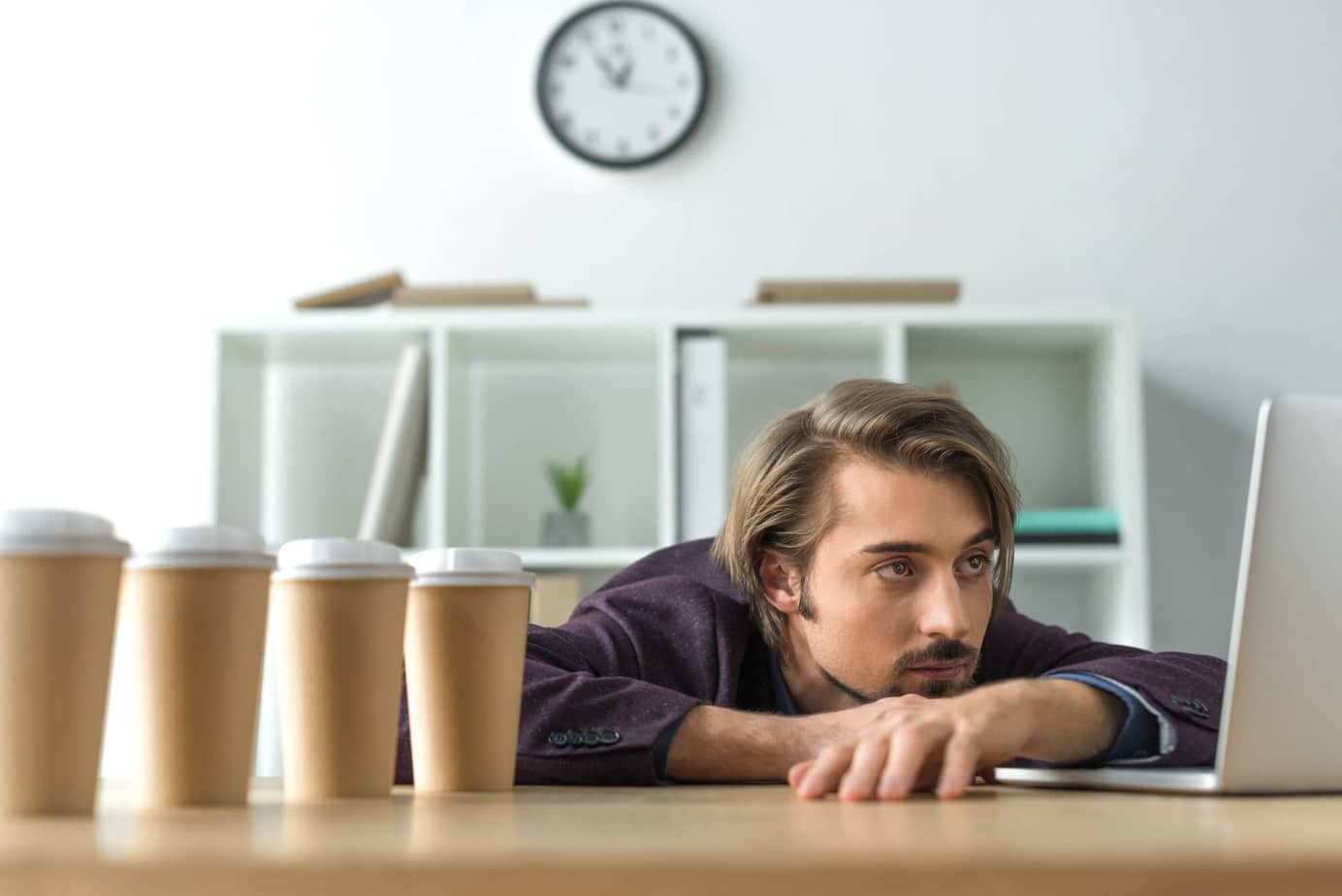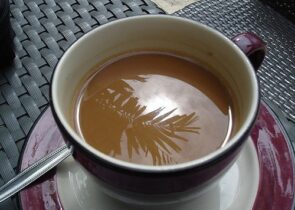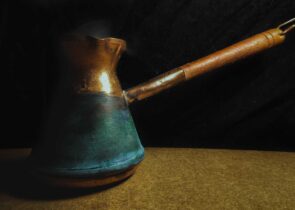A cup of coffee is a great way to help people feel more awake and alert in the morning, as it’s an easy — not to mention delicious — source of caffeine.
Despite it being a caffeinated beverage, though, some of us might find ourselves ready to nod off after a few cups of coffee, and that poses the million-dollar question: why? If coffee is supposed to help keep me up, you ask, why does it sometimes make me tired?
That question (plus a few more) is exactly what we intend to answer here. We’re taking a closer look at the causes of, and potential solutions for, coffee-induced fatigue in hopes that our guide can help all you regular coffee drinkers make the most of your morning cup.
Recommended: The Pros and Cons of Coffee

Why Coffee Makes You Tired
So, brewing that second batch of coffee every day isn’t enough to get you through those afternoon slumps, huh? Or even worse — you’ve found that your beloved joe has betrayed you, and instead of giving you a much-needed jolt of energy, you’re experiencing adverse side effects. What gives?
Let’s find out.
Pushing off the Inevitable
Your central nervous system produces a fun little chemical called adenosine, and it’s responsible for controlling your sleep-wake cycle. During the day, adenosine levels gradually increase, and as this chemical is absorbed, you begin to feel more tired.
The caffeine in coffee blocks adenosine receptors, so as the adenosine is being produced, you aren’t absorbing much, if any, of it after you’ve consumed a coffee drink. When the caffeine from coffee wears off, though, well, that’s a different story. When that happens, your receptors are flooded with adenosine, which leads to a significant energy slump and sudden drowsiness.
Dehydration Station
Caffeine is widely considered to be a diuretic, which means that, for many people, it increases the urge to urinate. It may also increase colon activity, which means you may be headed to the bathroom for, you know, more frequently.
As a result of this increased excretory activity and water loss, dehydration may occur. And since most people don’t drink enough water to begin with, sipping coffee or other caffeinated products makes you use the little water you’ve already got in your system too quickly.
Plus, since caffeine is a stimulant, it raises your heart rate. This, in turn, increases your body temperature and causes you to sweat, and once that occurs, you can pretty much say goodbye to any water you have left in your body and hello to dehydration.
Dehydration is one of the leading causes of sluggishness and fatigue, as this decrease of fluid in your body impacts your blood pressure and blood flow. It doesn’t help that, when these effects start to come on, many people think upping their coffee intake for the day can counteract the tiredness. Another cup of coffee seems like a sensible solution at first, since caffeinated drinks are known for being energy boosters, but unless you pair the joe with a glass of water or two, you’re only going to make things worse.
Sugar Rush … and Crash
You probably already know that with every sugar rush comes the infamous sugar crash. And yes, that happens with the sugar you add to your coffee, too. Your taste buds might appreciate you adding a spoonful of sugar into your beverage, but the rest of your body should know the sweet stuff could be part of your crashing problem.
If you’re just adding a little sweetener to your one or two cups per day, you probably won’t experience too many adverse effects. However, if sugary drinks are always your go-to, especially those with syrup or whipped cream, you might want to reconsider your coffee choices.
A sugar crash is so intense because sugar is processed significantly faster than caffeine is. So, while you might not experience a post-caffeine consumption crash until the middle of the day, a sugar high might fade in as little as 90 minutes.
How to Fix It
Many coffee fans won’t even consider ditching their morning companion for decaf or skipping coffee altogether. Still, the good news is, if you make a few adjustments to your coffee routine and counteract the effects of caffeine, you probably won’t need to. Here are a few tips for you to try.
Sip Smarter
You should know it’s not recommended for anyone to consume more than 400 milligrams of caffeine per day. For reference, if you were to use an eight-ounce cup to measure that out, it would equal two to four cups of brewed coffee.
The average person probably won’t consume more than 300 milligrams of caffeinated coffee per day, but an avid coffee drinker who also gets a few more milligrams of caffeine from other food and drink very well might.
Avoid overdoing it by being a more conscious consumer. Keep track of all your caffeine sources, including soft drinks, energy drinks, or even some pain relievers; these are all common parts of many people’s daily routines.
If you keep a lower amount of caffeine in your system throughout the day, you can better mitigate its effects. For example, instead of chugging your morning cup before you leave, bring it with you in a travel mug and sip it throughout the morning. Then, you can switch to something that’s still caffeinated but perhaps weaker around midday; whether that’s a different brew, blend, or drink altogether is up to you.
Don’t think you’re automatically in the clear by consuming less caffeine, though. Because it affects everyone differently, even your lower intake of the stuff may be hurting your energy levels.
HYDRATE!
We mentioned that hydration, or lack thereof, can be a serious issue for a serious coffee fanatic. The solution is pretty easy for this one: just drink more servings of water per day! We know people have probably told you this your whole life, but if you want to keep up your coffee habit, you really should listen this time.
The average adult male should aim for about 15 cups of water — that’s a little less than a gallon — and the average adult female should try to drink about 11 cups. That amount includes the water you get from food and other beverages.
As far as pure water is concerned, you should be drinking about half a liter daily. That’s eight glasses, each filled with eight ounces of water. That might seem like a lot, but keep in mind that the average water bottle holds about 17 ounces, and four refills a day isn’t so crazy.
Drink plenty of water! And if you’re having trouble motivating yourself to drink it without adding a ton of sugary flavoring, try getting a filter or implementing an accountability system into your planner; there are a ton of apps for that if you’re looking for something low-maintenance.
Skip the Sugar
Like everything else in life, sugar or some other bit of sweetener may be okay in moderation, but some people are more sensitive to it than others. That’s why, if you already know you react pretty strongly to it, you should probably cut sugar out of your coffee routine entirely.
If you don’t enjoy the taste of your morning brew on its own, try switching to a different type of coffee or make it with another brewing method. We know the taste takes some getting used to, but drinking black coffee has some serious perks.
However, some people just need sweetness in their joe, and in that case, an alternative sweetener comes in handy. There are plenty of sugar-free flavored syrups out there, and let’s be honest, cutting the whipped topping really won’t kill you. If you really must have some sugar in your cup, try limiting yourself to just a sprinkle of it in your morning coffee rather than dumping in your usual three or four heaping spoonsful.
Less sugar doesn’t have to be a bad thing. And who knows? You might find that you can actually detect some of the tasting notes printed on your bag of beans when they’re not drowned in sugary sweetness.
Do Some Self-Evaluation
While the midday caffeine crash is a very real thing, it may be time to make some new lifestyle choices if you feel drowsy all the time.
For example, cutting the coffee won’t fix anything if you’re using it to gloss over the fact that you aren’t getting more than four to six hours of sleep. Catching some decent Z’s more than just every once in a while is the only way you’ll get the energy boost you’re after.
High stress levels, sedentary lifestyles, dietary habits, and even hydration levels can affect your energy. Sure, excessive coffee and caffeine consumption can exacerbate some of these issues, but getting to the root cause of your fatigue is the most helpful course of action.
Last Resort
We know many of you would be appalled if we even suggested you try decaf, so we’re not going to bring it up. But we will say that half-caffeinated beans exist, and they’re great for those of you who are particularly sensitive to the fatiguing effects of caffeine.
If a pod machine is your trusted source of brewing joe, Maud’s Coffee has a popular half-caff offering for you to try, and Coffee Bean Direct sells a fantastic lower caffeine Colombian coffee for the grind-it-yourself types.
With one of these options or one of the many others on the market, you can still get a decent caffeine boost in the morning with a less severe midday crash — if there’s one at all. Combine this one with one or two of the other tips on this list, and you’ll be good to go for sure.
FAQs
Will I have more energy if I stop drinking coffee?
This question seems a bit counterintuitive. After all, besides the delicious coffee flavor we’re crazy about, an energy boost is the biggest reason we pour cup after cup of Brazilian coffee every morning. But, it’s worth asking: will completely cutting your daily coffee consumption give you more energy in the long run?
If you stop drinking coffee, there is a chance of your energy levels increasing. Since you won’t have coffee’s caffeine content to mask your fatigue, you’ll have no choice but to get to the root of it. And once that happens, you can correct the issue and eventually have more energy.
Plus, cutting coffee eliminates the anxiety-related symptoms caffeine induces, like jitters, racing heart, and heavy breathing, and getting rid of that unpleasantness is always a plus.
How many hours before sleep should you stop drinking caffeine?
According to the Sleep Foundation, you should avoid consuming caffeine within six hours of your bedtime, especially if you have difficulty sleeping anyway.
The effects of caffeine may reduce the amount of time you slow-wave sleep, which is the stage of sleep that leaves the body alert and well-rested. Plus, a night’s sleep interrupted by caffeine-filled java can lead to sleep deprivation and issues with emotion regulation, learning, and memory the next day. For these reasons, you mustn’t make a habit of consuming high amounts of caffeine before bed.
Wrapping Up
The truth is, coffee can make you feel tired, but it’s probably not the root of your fatigue problem. More than likely, its caffeine content is simply masking the real issue, which could be a lifestyle that’s not active enough, high stress, insufficient sleep, or dehydration.
With that said, the best way to combat tiredness or exhaustion after a cup of coffee is to be intentional: be a conscious consumer, stay hydrated, and get plenty of sleep. For even better results, consider cutting sugar out of your brew or switch to a half-caff coffee, which isn’t half bad!
Happy (Careful) Caffeinating!







